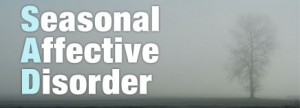Seasonal Affective Disorder (SAD)
 Seasonal affective disorder (SAD), also known as seasonal depression, is a mood disorder in which people experience depressive symptoms in the fall and winter months.
Seasonal affective disorder (SAD), also known as seasonal depression, is a mood disorder in which people experience depressive symptoms in the fall and winter months.
Our moods and energy levels fluctuate with the seasons. Traditional Chinese Medicine understands these seasonal cycles, and that conflict in the body causes stress, which can result in SAD.
Low levels of vitamin D and limited exposure to ultraviolet-B on their skin,can also result in SAD.
What is Seasonal Affective Disorder?
Seasonal affective disorder is a type of depression that people experience at the same time every year. Typically symptoms start in October and continue until April. The symptoms include:
- Irritability
- Headaches
- Extreme fatigue
- Increased appetite/cravings
- Lack of concentration
- Decreased libido
There are many theories as to what causes SAD, and most of the theories involve light. Serotonin, a neurotransmitter that affects mood, is triggered by light, and that the decreased serotonin is the culprit. Others theories involve melatonin, a hormone that affects sleep and mood, because it is affected by darkness. In either case, light plays a role.
Acupuncture is a very effective option for treating SAD. Anxiety, SAD, and other mood disorders respond very well to acupuncture. Acupuncture has been proven to relieve stress and have a relaxing, calming effect on the body. Patients suffering from SAD will often feel immediate relief following a treatment. With regular, continued treatments, acupuncture can help to minimize and prevent SAD symptoms and help the body adapt to seasonal changes.
Acupuncture helps our bodies to regain its natural balance by correcting various systems that are responsible for sleep, energy, and immune system.
Advice for Seasonal Affective Disorder
- Limit carbohydrates in the form of starches and sweets; add more protein and dark coloured vegetables to your diet
- Avoid overeating or gaining weight
- Exercise regularly by walking 15 minutes a day when there is the most sunlight
- Work by a window to allow exposure to natural light
- Go to bed earlier and get up earlier so you maximize daylight hours
- Think positive – keep a gratitude journal
These are health-promoting strategies that will help to relieve your seasonal symptoms and improve your health.


I’m wondering if a sudden shift in weather patterns can trigger SAD. Certainly I have been feeling *achy & crabby (I do have a bit of OA)
I’m still having to face the brunt of lousy weather what with my daily paper del. routine so I can’t really get around avoiding the blackness of the early morningsas well as the torrential rains which would test the patience of a saint!
Chris
*maybe Tanya was right after all 🙂
Hi Chris,
You are correct, a sudden change in weather patterns can trigger seasonal affective disorder.
Carmen